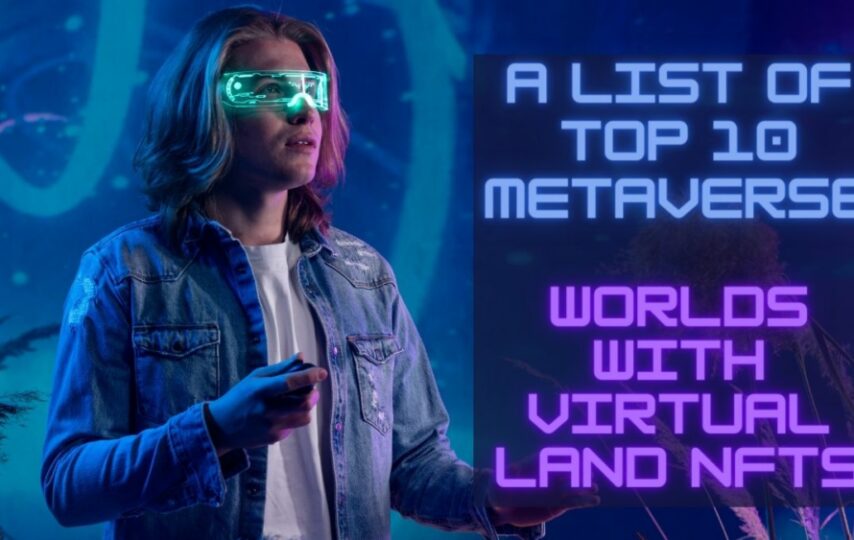Land NFTs, also known as non-fungible tokens, are used in virtual environments such as metaverse consulting services to represent ownership of virtual land. Users can communicate with one another, create and share digital content, and participate in various virtual activities while logged into these virtual worlds, which are realized as digital environments within computer networks.
Land NFTs can be purchased, sold, and exchanged like other non-fungible tokens (NFTs), such as digital art or collectibles. In a metaverse, verifying ownership of a particular part of virtual land requires verification.They can be used to construct that land, create objects on it, and earn money by renting or selling it to other users in the world of Metaverse.
They validate ownership of a specific plot of virtual land in a metaverse. Land non-fungible tokens are a new and growing subset of the non-fungible token market, and it is projected that their use in Metaverse virtual worlds will become more widespread over time.
The phenomenal growth of the metaverse consulting services has undeniably affected how we will use technology. There is another lucrative option that is competitive with real estate. Significant quantities of financial resources are drawn to virtual land.
The top 10 metaverse worlds with virtual land NFTs are listed below.
- Decentraland
- Somnium Space
- Cryptovoxels
- NFT Worlds
- Substrata
- NetVRK
- TCG World
- Spatial
- WorldWide Webb
- COMEARTH
Consider the following Metaverse that uses trading in Land NFTs.
1. Decentraland
The Ethereum blockchain serves as the foundation for this platform of virtual reality. The builder instrument is capable of creating vast universes. Users can purchase and sell Property, houses, avatar clothes, and names in the NFT marketplace.
Over the last 30 days, Decentraland has seen an amazing $5.87 million in transactions.
Who controls the virtual worlds in Metaverse?
Participants in the Decentralized Autonomous Organization can vote on various rules, including LAND auctions, direct sale costs, and the safe listing of NFT contracts (DAO). Decentraland hosts a wide variety of events, some of which include comedy podcasts, gaming tournaments, and professional wrestling fights.
2. Somnium Spatial
Somnium Space is a community based on blockchain technology and open-source. It allows users to purchase virtual land on which they can build virtual houses and other virtual reality structures.
The occupants had a significant hand in shaping this ecology. Additionally, Somnium 2.0 was made available, bringing the project closer to its ultimate goal of providing Game Player One with a genuine virtual experience.
In contrast to Somnium 2.0, other multiplayer games in Somnium Space are segmented into sub-servers and mirror-instanced rooms. Somnium 2.0 serves all its players in a single enormous space.
3. Cryptovoxels
Utilizing Cryptovoxels as a blockchain-based virtual environment and constructing within it is one of the easiest tasks to perform. To explore, all that is required is to click on a URL; no additional software or hardware is required.
In addition, possession of land is optional to visit and enjoy Cryptovoxels. Before making a purchase, customers should be advised that each land parcel is a non-fungible token (NFT). This denotes that the land parcel is one of a kind and cannot be replicated or duplicated, just like genuine physical land.
4. NFT Worlds
NFT Worlds are platforms that make it possible to create locations, experiences, and games. It does this by utilizing the blockchain of Ethereum to create a multi metaverse consulting services environment. Tokens worth $WRLD will be distributed to several proprietors located all over the world. ERC-20 token holders have access to various assets and the possibility to purchase non-fictional characters.
Players can earn bonus tokens of $WRLD by participating in events and competitions and coming out on top. Each NFT world has its topography and geography generated through a random process. In addition to that, they work with Minecraft. There are roughly 762 people that own Ethereum, and approximately 48,300 of these tokens are traded daily (ETH).
5. Substrata
The second virtual world, known as Substrata, is currently being developed in the computer game which was developed by metaverse consulting services company. It is a relatively new 3D virtual environment that functions very differently from the other platforms on the list.
In addition, it is wise to keep an eye out for free apps that can remove malware. Since Substrata is not mainly focused on creating NFT games, a player’s entire parcel collection may consist of as few as Ethereum NFTs. This is because Substrata is not exclusively focused on developing NFT games.
Users can navigate public space, engage with one another, make objects, play, and purchase a private room or plot of land to personalize. It is also speculated that it is based on something other than the creation of NFT games.
6. NetVRK
The mission of NetVRK is to build a one-of-a-kind virtual reality (VR) ecosystem with two primary goals: to encourage active participation from users and to make it possible to generate an infinite number of virtual worlds without the need for a significant amount of prior technical expertise.
NetVRK is a metaverse consulting services platform that enables the sharing, engagement, and monetization of works by utilizing its powerful architecture and suite of creation tools. With an emphasis on education, gaming, and virtual workplaces based on the ownership of virtual land and assets.
7. The TCG World
The introduction of NFTs for virtual land in TCG World has many players excited. With these digital assets, players can now own a piece of the virtual world, and can even earn money by selling or renting out their land. The NFTs also provide a new level of immersion in the game, as players can now build and decorate their own virtual properties.
Not only that, but owning a virtual land in TCG World can also be a way to showcase your status and achievement in the game, as it serves as a evidence of player’s dedication and engagement with the game.
However, it’s important to remember that these virtual lands are not backed by physical assets and the value of these NFTs is highly speculative and may fluctuate depending on a number of factors, such as the popularity of the game, the number of players and the supply and demand for virtual land.
Overall, TCG World’s introduction of NFTs for virtual land is an exciting development in the world of virtual real estate and digital collectibles, and it will be interesting to see how players and investors respond to this new opportunity.
8. Spatial
Spatial was one of the earliest metaverse worlds to focus on the working environment. Because of this technology, navigating virtual worlds while utilizing completely 3D avatars is an easy process. Despite this, the role is best recognized as a premier location for holding exhibitions and other events associated with NFT. Spatial is establishing new connections to strengthen its NFT concentration.
9. WorldWide Webb
WorldWide Webb is an online role-playing game powered by blockchain technology and takes place in a pixelated cyberpunk virtual environment (W3). A gathering place for users to collaborate, travel, and do business together.
It uses non-fungible tokens to represent in-game pets, lands, items, quests, and avatars rather than traditional currency. The project’s primary goal was to establish collaborative relationships with well-known NFT projects such as CyberKongz, CryptoPunks, BAYC, Moon Cats, and others.
10. Comearth
Polygon, a blockchain-based metaverse, has been launched by COMEARTH. Participation in a certain activity may be advantageous for consumers, advertisers, and businesses. Within the Metaverse, businesses can establish virtual offices, shops, and stores to promote three-dimensional client interactions.
In addition to being able to choose the products that best match their needs, customers also have the option of purchasing land in a virtual setting. Individuals have the legal right to possess a small parcel of land. They have access to a number of hand tools that can be used to construct their own Metaverse. There are numerous ways in which citizens can benefit from the presence of traffic.
To Summarize
The virtual worlds mentioned earlier, the Metaverse, have already earned millions of dollars’ worth of purchases of virtual land.
The quantity of money that is involved in the Metaverse creates the temptation to make an investment with the goal of achieving a big return on that investment. Every favourable aspect has at least one negative side effect. Customers are unable to determine the accurate value of any asset that is being exchanged on the Metaverse, which presents an opportunity for exploitation through trading.
If you need in metaverse consulting services, you can see a lot of options available in the market who offers virtual worlds in metaverse development for your NFTs projects.








